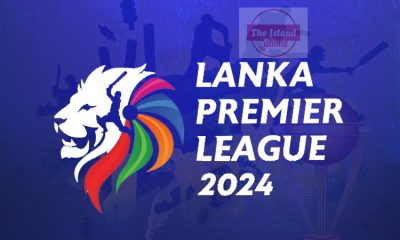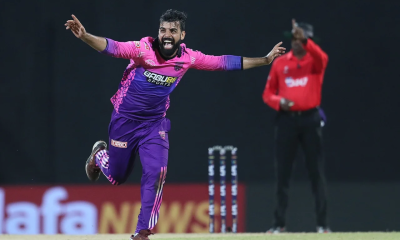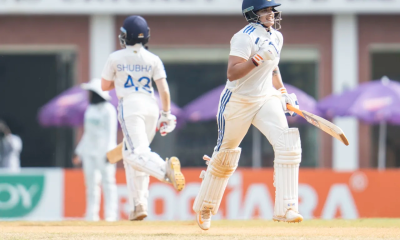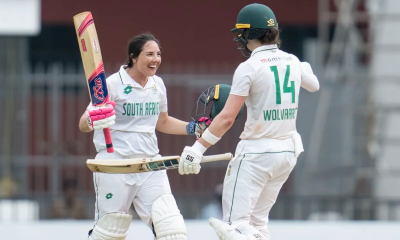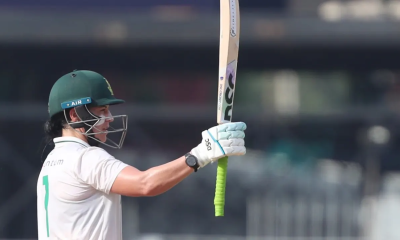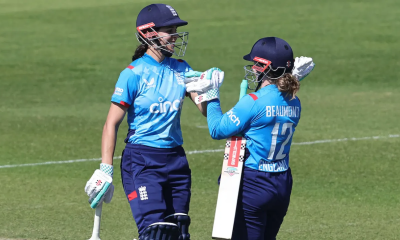Sports
When your best brains call the shots
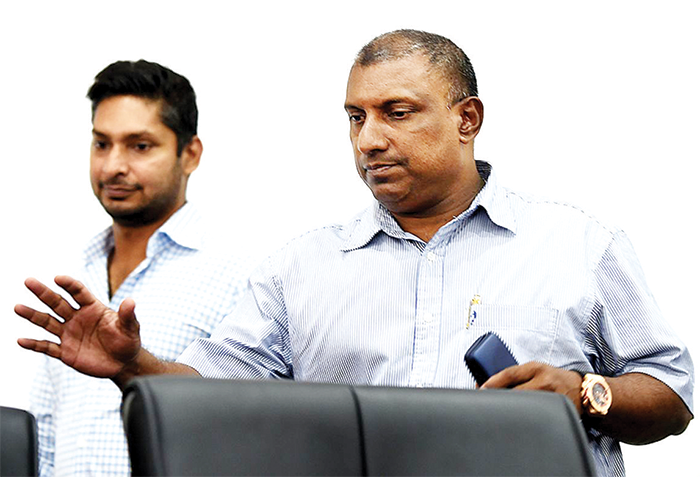
by Rex Clementine
There’s a feeling that the national cricket team has turned things around in white ball cricket after some humiliating experiences in the last seven years where there were whitewashes in plenty and failure to earn automatic qualifications for ICC events. Sri Lanka’s come from behind win in the Asia Cup in UAE is definite indication that the team has certainly made a leap forward. A few people were quick to take credit for the team’s success. As they say, victory has thousand fathers but defeat is an orphan.
There are some individuals who have enjoyed Sri Lanka’s recent success but haven’t gone onto claim credit. Former captain Aravinda de Silva and his Cricket Advisory Committee comprising Roshan Mahanama, Kumar Sangakkara and Muttiah Muralitharan certainly deserves much credit for revamping the cricket structure and introducing some drastic change.
One of Aravinda’s committee’s main decisions was to bring in youth for white ball teams. The young team wasn’t covering themselves in glory at the initial stages and the idea was even frowned upon. However, with constant exposure and with Dasun Shanaka chosen as the new captain, the team started to compete and earlier this month in UAE hit a purple patch. To win five games in a row was quite an achievement and when you think that three of those wins were against India and Pakistan, world’s number one and two ranked teams, you realize how special this was.
There was also a new fitness regime that was introduced around that time. It became a bone of contention with several players becoming ineligible for selections after failing fitness tests. It helped that Sri Lanka had a Head Coach in Mickey Arthur who valued fitness immensely. This resulted in players taking fitness seriously and the consequences of that were less injuries and improved performances.
Restructuring of the coaching department by depending heavily on local talents was another area that was done by the Cricket Advisory Committee. It was not only the national team that was looked at but dedicated coaching staff for under-19, development squad and the ‘A’ team were timely moves.
Another decision taken by them was introducing a new payment scheme for players whereby a performance based system was introduced. Although it was challenged at the start, the stakeholders bought into the new system as it was on merit rather than seniority. The Cricket Advisory Committee’s tenure was short lived but the structures that they put in place were vital in reviving the fortunes of the national cricket team.
Not all parties agreed with the changes that were introduced but they were needed. The Asia Cup win was Sri Lanka’s first major series triumph in eight years. If Sri Lanka wishes consistency on the cricket field moving forward, we need to make most of some of the best brains that we have in the game. Credit should go to Sri Lanka Cricket as well for agreeing to take a back seat and allowing their former captains to call the shots on vital matters in a bid to make the national cricket team competitive again.
Sports
Rehan century highlight of final day

Royal fought back on the back of a valuable five wicket haul by Himaru Deshan to earn first innings points against Richmond in the Under 19 Division I Tier ‘A’ match at Reid Avenue on Thursday.
In their second essay, the home team posted 209 for one wicket at close with Rehan Peiris producing an unbeaten century.
Rehan and Hirun Liyanarachchi added 163 runs for the first wicket.
Rehan’s unbeaten 102 runs came in 112 balls and it included ten fours and a six.
Hirun’s aggressive knock of 75 runs was scored in 76 balls. He scored 12 fours and a six.
Earler on Richmond struggled to post 204 in reply to Royal’s 254 runs. Open batsman Risinu Rupasinghe (62) was the top scorer, while Ameesha Rasanjana and Tenusha Nimsara made 20s.
For Royal, Mihiru Kodituwakku (2/22) and Dushen Udawela (3/36) were the other two bowlers to take wickets.
Sports
Star Garments, CBC Finance, Allianz Insurance, VS Information Systems, Home Land and Millennium IT ESP register wins on Monday

15TH MCA G DIVISION T 20 LEAGUE TOURNAMENT
Star Garments, CBC Finance, Allianz Insurance, VS Information Systems, Home Land and Millennium IT ESP registered wins in the MCA G division league stage matches played last Monday.At the Nationalised Services Cricket Association grounds at Rathmalana, Nadeesha Rajakaruna scored 54 runs and Chathuranga Dilshan claimed a four-fer to help Star Garments overcome AIA Insurance by 8 wickets.
In the afternoon game at the same venue, an unbeaten half ton by Dilan Buddika and a four fer by Pradeep Kumar saw CBC Finance defeat Ceyline Holdings by 101 runs.
An unbeaten 116 off 52 balls which included 17 boundaries and 4 sixes by Dulan Avishka and three wicket hauls by Charinda Fernando and Naveen Vass Alianz Insurance overcome Trans by 169 runs in the morning.
In the afternoon game VS Information Systems registered their second win of the tournament to lead group F by defeating DSI group by three wickets.
At the D S Senanayake College grounds half tons by Suranga Gamage [65 not out] and Thevindu Senarathne [55] helped Hoe Lands Group overcome Swisstek Ceylon by nine wickets with 8 overs to spare. Powered by a four wicket haul [4-04] and an unbeaten 34 by Uvindu Andurajith, Millenium IT ESP beat Coats Thread by seven wickets In a low scoring game in the afternoon.
At NSCA ground Ratmalana
Star Garments won by 8 wickets
AIA Insurance
118/10 in 20 overs [Sasanka Kularathna 44,Nuwan de Silva 21, Sujith Siriwrdana 13; Suwahas Yapa 1-29, Dunik Perera 1-13, Dulanjana Abeysinghe 2-29, Chathuranga Dilshan 4-08]
Star Garments
122/2 in 11.1 overs [Nadeesha Rajakaruna 54, Dileep Fernando 43, Dunik Perera 11*; Isuru Madhusanka 1-21, Avindu Fernando 1-31]
CBC Finance by 101 runs
CBC Finance
162/7 in 20 overs [Asanka Fernando 15, Methusha Wijethilaka 19, Harsha Fernando 21, Shehara Fernando 26, Dilan Buddhika 50*, Keshika Dilshan 11; Anushka Fernando 2-35, Tharindu Munasinghe 1-14, Chameera manamperi 1-12, Devindra Fernando 1-31, Kaviru Sannasooriya 1-37]
Ceyline Holdings
61/10 in 12.4overs [Tharindu Munasinghe 10, Shane Deshabandhu 10, Anushka Fernando 12; Ravindu Nimsara 2-17, Dilan Budhdhika 2-14, Pradeep Kumar 4-12, Keshika Dilshan 2-06]
At MCA grounds
Allianz Insurance won by 169 runs
Allianz Insurance
243/3 [Yohan Ravishka 58, Dulan Avishka 116*, Sameera Fernando 40, Ranga Dias 10*; Shiran Chathuranga 2-33, Dasun Gunathilake 1-55]
Trans
74/10 in 19.1 overs [Sachin Silva 12, Thilanka Sachin 28; Charinda Fernando 3-06, Mayura Ranasinghe 2-21, Naveen Vaas 3-14, Sameera Fernando 1-10, Ranga Dias 1-0]
VS Information Systems by three wickets
DSI Group 114/9 in 20 overs [Ochintha Nadeeshan 14, Avishka Madushan 13, Yasas Weerasekera 13, Udith Indunil 32, Mahesh Wediwardena 11; Adeesha Bandaranayake 1-29, Chamath Chamupathi 3-17, Nimnada Kirindage 1-12, Ayesh Lakmal 2-16, Kasun Bandara 2-28]
VS Information Systems 118/7 in 19.4 overs [Nimnada Kirindage 10, Chamath Chamupathi 18, Shamilka Wickramathilaka 51, Shan Aniketh 19*; Mahesh Wediwardena 2-20, Asitha Wijesekera 1-40, Udith Indunil 1-23, Nilinda Maddumage 2-17]
At D S Senanayake College grounds
Home Lands Group by nine wickets
Swisstek Ceylon
156/8 in 20 overs [ Lasith Karunathilake 13, Danidu Wijekoon 20, Supun Wijesinghe 30, Dushmantha Dias 23, Tihan Senanayake 37; Sanura Dias 1-13, Umesh Lakshan 1=22, Thiwanka Ginige 1-24, Malith Fernando 3-21, Reshan Basnayake 1-30]
Home Lands Group
157/1 in 12 overs [Suranga Gamage 65*, Thevindu Senarathne 55, Sehan Herath 11*; Gamini Wanasingha 1-31]
Uvindu powers Millennium IT ESP to seven wicket win
Coats Thread
57/10 in 16.1 overs [Ravi Lakshan 22; Uvindu Adurajith 4-04, Yehan Hettiarachchi 3-10, Eeshan geethanjana 2-14, Charith Rathnaweera 1-05]
Millennium IT ESP
61/3 in 7.5 overs [Uvidu Andurajith 34*; Thushan Malintha 2-14, Arun Nagalingm 1-19
Latest News
India in final after clinching high-scoring thriller

On a night of pulsating drama, studded with 499 runs in 40 overs, including 34 sixes, India sealed their progression to Sunday’s T20 World Cup final, thanks to Sanju Samson’s second defining knock in as many matches, and a display of targeted magnificence from the inevitable Jasprit Bumrah. But to do so, they had to withstand an innings from the ages from the precocious Jacob Bethell, whose 105 from 48 balls kept England swinging for the fences in a heroically thwarted chase in Mumbai.
Set an unearthly 254 to win, after Samson had backed up his crucial 97 not out against West Indies with another mighty innings of 89 from 42, England lost three wickets in the powerplay, and eventually drifted out of contention as India’s seamers held their nerves in the death overs to leave an improbable requirement of 30 from the final over.
In the final analysis, however, it was the fine margin of fielding that made the key difference. Where Harry Brook dropped an utter clanger in the third over of the match, to reprieve Samson on 15 and leave his hapless bowler, Jofra Archer, winded and mojo-less, India’s defence turned on two stunning pieces of work from Axar Patel in the deep.
The first, at deep cover, showed Brook how it’s done, as England’s likeliest matchwinner was extracted for just 7 from 6; the second, at deep backward point, was an incredible running relay effort to intercept an uppercut from England’s player of the tournament, Will Jacks, whose 77-run stand for the fifth wicket with Bethell had given England a strong chance as they approached the final six overs.
Suryakumar Yadav said he would have batted first had he won the toss, which sounded like a bluff, given how compellingly the stats warned against it. No team had batted first and won a floodlight knockout at the T20 World Cup for 13 consecutive matches, since Sri Lanka’s victory over West Indies in their 2014 semi-final.
By the end of a 67-run powerplay, however, the inevitable was already charging into view. Sanju Samson had come into the contest with an unfavourable match-up against Archer – three dismissals for 23 in 25 previous deliveries in T20Is – but he also had the momentum of his match-winning knock at the weekend. He scarcely needed a helping hand to send his innings into overdrive.
Brook offered it nonetheless. It is hard to conceive of a more costly drop than the one England’s captain put down at mid-on in Archer’s second over. Samson had already cashed in on his shorter length, with two fours and a six in his first six balls, when Archer aimed a yard fuller and induced a scuffed drive at throat height. It was a dolly by any measure, and Brook’s face was a picture of guilt – first as the ball burst through his fingers, and then when Samson bludgeoned Archer high over the leg side two balls later.
At least Abhishek Sharma’s fallow campaign had been extended by that point – with Will Jacks trading two thumped fours for a miscue to deep midwicket in his opening over. It meant that England were spared a direct re-run of their previous bowl-first ordeal at the Wankhede, 13 months earlier, though the lessons of that night scarcely seemed to have been heeded.
Archer retreated with figures of 0 for 26 in two overs, to be replaced by Jamie Overton, who strayed far too full throughout his night’s work, and then by Sam Curran, whose change-ups could not stem the tide either. Samson was too well set to be suckered by the moon-ball, which he duly plonked over the head of mid-off.
The second most culpable moment of England’s fielding effort, however, was still to come. With two run-hungry batters itching to hit the spin, Liam Dawson’s introduction for the eighth over felt like a plan with too many drawbacks. Ishan Kishan and Samson duly traded a six apiece in a 19-run demolition, and for the first time in his T20I career, Dawson was effectively rendered unusable.
The gloves were off from that point on. Curran returned for a change of ends but was subjected to a 20-run tag-teaming, and at 112 for 1 after nine overs, jeopardy had left the building for India’s batters. Kishan flogged one last boundary before miscuing Rashid to long-off for 39 from 18, but out strode Shivam Dube to exact revenge with two huge strikes over long-on in the legspinner’s third over.
Archer’s return for a rare mid-innings foray telegraphed England’s desperation. But Samson, similarly, had eyes only for the boundary, and none on impending milestones. He continued to accelerate into his night, marching into the 80s with two more sixes to take his personal haul to seven, before that man Jacks lobbed a wide length ball across his bows to induce a miscue to deep cover. Since the start of India’s must-win in Kolkata on Sunday night, Samson had battered the small matter of 186 runs from 92 balls.
The only moment of genuine traction for England came in the 18th over, as Curran closed out his tough night with an excellent array of yorkers. And yet, he still went for 12, as Dube clubbed his fourth six before being sold a dummy by Hardik Pandya… who then lost control of his bat in a slog through the line, only for Tom Banton to spill the resultant chance at long-on.
Archer’s final over wasn’t anything like the same quality. He retreated with gruesome figures of 1 for 61, as Tilak Varma slotted three sixes in four balls before inside-edging onto his stumps for the most pyrrhic wicket of the night. Thereafter, Hardik was able to farm the strike for his favourable match-up with Jacks, belting two last sixes over the leg side to romp India past 250.
The good news for England was that Phil Salt flicked their first ball of the chase through fine leg for four, and that Jos Buttler also found the boundary for the first time in six innings, with an emphatic thump over the covers two balls later.
The bad news for England was that the bowler on the receiving end was not Jasprit Bumrah, but Arshdeep Singh. India had given themselves license to keep their most deadly weapon in reserve, and see what lumps they could extract before his deployment. Pandya duly obliged with a first-ball outswinger that Salt could only skew to cover, to end his fallow campaign with 5 from three balls.
Bumrah’s eventual entry, for the fifth over, produced a moment of poetry. A first-ball cutter suckered Brook straight out of the hand as he skied the ball high out to extra cover, but if that was good, then the snapping of the trap was even better, as Axar tracked back from the edge of the ring and clung on with a full-length dive, looking over his shoulder.
Back he went, up Suryakumar’s sleeve, not to be seen again until the 11th over, and then hidden again until the 16th, by which point an eight-run over was gold-dust. His pinpoint dot-ball yorker to Sam Curran was greeted with one of the loudest cheers of an already raucous night.
Such was England’s refusal to buckle, however, that with 45 still needed from 18, Bumrah had to go again immediately. A barrage of perfect yorkers offered up just four singles and a two, to leave England needing back-to-back 20-run overs. That was the game, there and then.
Bumrah’s extraction of Brook for 7 from six had been a perfectly targeted strike, but Bethell strode out with a refusal to be overawed. He silenced the Wankhede’s “Boom Boom” chants with a second-ball swivel-pull for six over fine leg, then greeted Varun Chakravarthy with three more in a row, over long-on, long-off and deep third, as if to plant his 360-degree versatility like a flag.
In the same over, however, England lost their third powerplay wicket, and another of their kingpins. Buttler’s ugly campaign had flirted with resuscitation even as he kept losing his shape on a succession of heaves across the line. However, for the third Wankhede innings in a row, he reached the 20s at a 150 strike rate and then immediately gave it away, this time to a flat-footed waft across Varun’s googly.
Astonishingly, England still emerged from the powerplay one run to the good – 68 to 67 – but at three wickets down, it was already a clear race between runs required and wickets standing. Banton got the memo by drilling Axar’s first two deliveries down the ground for six before ruining the moment by slogging over the top of a more flighted follow-up, but Bethell took further lumps out of Varun’s figures with back-to-back fours to bring up England’s hundred in the ninth over.
His maiden Test century in Sydney had been an astonishing display of precocity and shot selection; this awesome effort was everything that he had forsaken to produce that innings and more. The self-sacrifice he had shown in his judgement outside off in January was translated into a full repertoire of 360-degree strokeplay. Until his ODI hundred against South Africa last summer, he had never previously made a professional century. Now, he has joined an exclusive club with three figures in all three formats. One thing is for sure, this won’t be the last the Wankhede crowd will see of him.
Brief scores:
India 253 for 7 in 20 overs (Sanju Samson 89, Ishan Kishan 39, Shivam Dube 43, Suryakumar Yadav 11, Hardik Pandya 27, Tilak Varma 21; Jofra Archer 1-61, Will Jacks 2-40, Adil Rashid 2-41) beat England 246 for 7 in 20 overs (Jos Buttler 25, Jacob Bethell 105, Tom Benton 17, Will Jacks 35, Sam Curran 18, Jofra Archer 19*; Arshdeep Singh 1-51, Hardik Pandya 2-38, Jasprit Bumrah 1-33, Varun Chakravarthy 1-64, Axar Patel 1-35) by seven runs
[Cricinfo]
-

 Features4 days ago
Features4 days agoBrilliant Navy officer no more
-

 Opinion7 days ago
Opinion7 days agoJamming and re-setting the world: What is the role of Donald Trump?
-

 Features7 days ago
Features7 days agoAn innocent bystander or a passive onlooker?
-

 Opinion4 days ago
Opinion4 days agoSri Lanka – world’s worst facilities for cricket fans
-

 Business1 day ago
Business1 day agoCabinet nod for the removal of Cess tax imposed on imported good
-

 Features4 days ago
Features4 days agoA life in colour and song: Rajika Gamage’s new bird guide captures Sri Lanka’s avian soul
-

 Features5 days ago
Features5 days agoOverseas visits to drum up foreign assistance for Sri Lanka
-
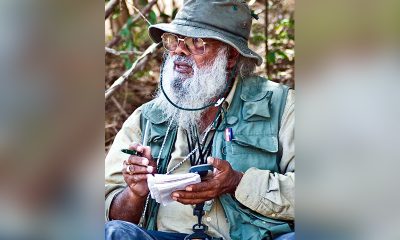
 Features5 days ago
Features5 days agoSri Lanka to Host First-Ever World Congress on Snakes in Landmark Scientific Milestone


